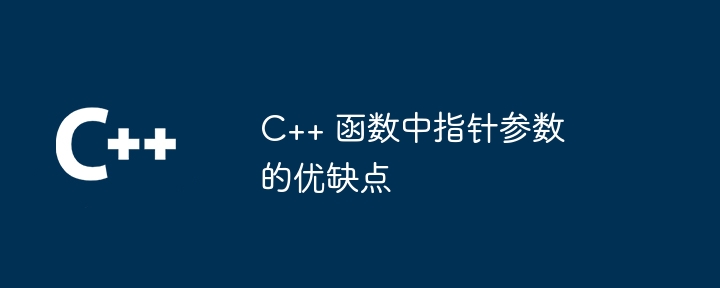Home >Backend Development >C++ >Advantages and Disadvantages of Pointer Parameters in C++ Functions
Advantages and Disadvantages of Pointer Parameters in C++ Functions
- WBOYWBOYWBOYWBOYWBOYWBOYWBOYWBOYWBOYWBOYWBOYWBOYWBOriginal
- 2024-04-19 16:09:011260browse
C Pointer parameter advantages: 1. Memory efficiency; 2. Efficiency; 3. Flexibility; 4. Polymorphism. Disadvantages: 1. Unsafe; 2. Difficult to understand; 3. Execution overhead; 4. Difficult to debug.

Advantages and disadvantages of pointer parameters in C functions
Advantages:
- Memory efficiency: Pointer parameters only pass the address without copying the entire object, thus saving memory.
- Efficiency: Pointers access variables by reference, eliminating the overhead of copying data every time a function is called.
- Flexibility: Pointers allow functions to modify the values of parameters passed by the caller.
- Polymorphism: Pointer parameters allow passing derived class objects, providing polymorphism for functions.
Disadvantages:
- Unsafe: Pointer parameters need to be handled carefully because pointers pointing to invalid memory may cause the program to collapse.
- Difficult to understand: Understanding functions that take pointer arguments can be more challenging than functions that take value arguments.
- Execution overhead: Pointer dereferencing requires additional processing time, which may impact performance.
- Difficult to debug: Pointer errors are difficult to debug because they may behave intermittently.
Practical case:
The following is an example of a C function using pointer parameters:
void swap(int *a, int *b) {
int temp = *a;
*a = *b;
*b = temp;
}
int main() {
int x = 10, y = 20;
swap(&x, &y);
cout << "x: " << x << ", y: " << y << endl; // 输出:x: 20, y: 10
}In this example, The swap function uses pointer arguments to swap the values of two integers. By passing by reference, a function can modify the original variables passed by the caller without creating copies of them.
Conclusion:
Pointer parameters provide memory efficiency and flexibility in C functions, but you need to pay attention to their safety and understandability. When considering using pointer parameters, you should weigh the advantages and disadvantages to make an informed decision.
The above is the detailed content of Advantages and Disadvantages of Pointer Parameters in C++ Functions. For more information, please follow other related articles on the PHP Chinese website!

